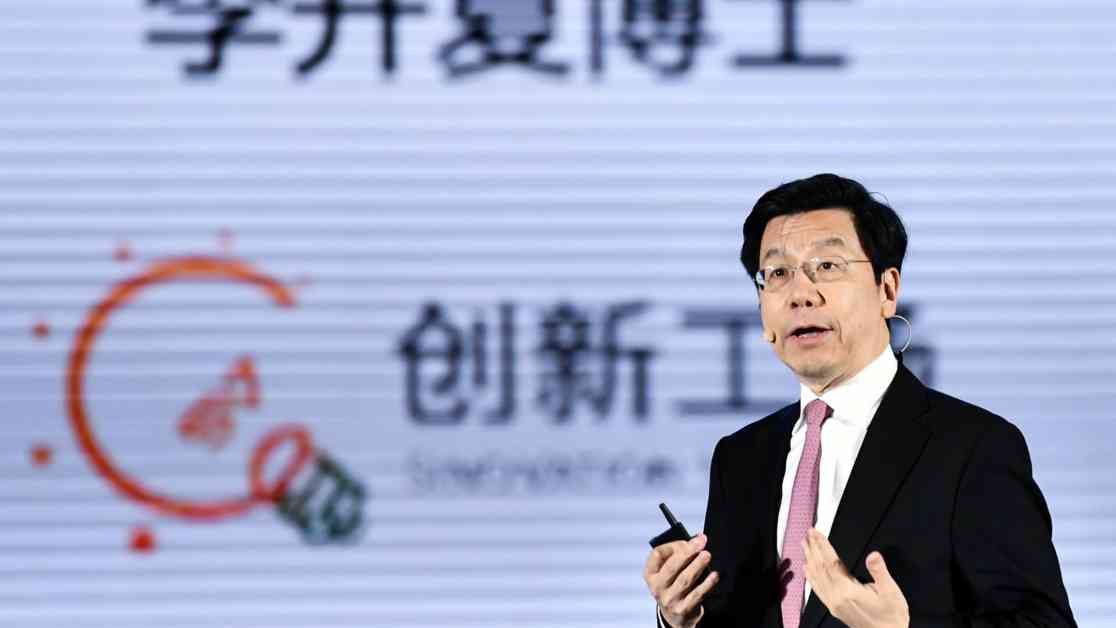China’s AI Development Trails U.S. by 6-9 Months: Ex-Google China Chief
Kai-Fu Lee, chairman and chief executive officer of Sinovation Ventures, recently shared his insights on the development of artificial intelligence in China compared to the United States. Speaking at the HICOOL Global Entrepreneur Summit in Beijing, Lee highlighted that while Chinese AI models may currently lag behind their U.S. counterparts by six to nine months, the pace at which Chinese AI apps are expected to take off is likely to surpass that of the U.S.
Large language models (LLMs) are a key focus in the AI industry, being trained on vast amounts of data to process and produce text, images, and videos. Lee noted that top Chinese companies’ LLMs are slightly behind those in the U.S., with less advanced Chinese models trailing by about 15 months. Despite this gap, Lee expressed optimism about China’s potential to excel in AI applications.
Lee, known for his book “AI Superpowers: China, Silicon Valley, and the New World Order,” is a respected figure in the AI community. He is the founder of startup 01.AI and the venture capital firm Sinovation Ventures. At the AVCJ Private Equity Forum China, Lee emphasized the rapid growth of AI apps in China compared to the U.S., attributing this trend to the decreasing costs of training AI models.
The Future of AI in China
As China continues to invest heavily in AI research and development, the country is poised to become a global leader in innovative AI applications. Lee predicted that by early next year, Chinese AI apps will proliferate at a faster rate than those in the U.S. This accelerated growth is expected to drive the evolution of AI consumer applications towards the development of a single “super app” capable of performing various tasks.
However, Lee highlighted the need for new devices to support the next generation of AI applications. He suggested that these devices should be “always on, always listening,” indicating a shift towards more seamless and integrated AI experiences. Major Chinese companies like Alibaba and Tencent have already made significant strides in releasing AI models and business products, paving the way for further advancements in the industry.
One notable example is Beijing-based ShengShu Technology, backed by Alibaba affiliate Ant Group. The company recently introduced a new feature for its text-to-video model, Vidu, which enhances the portrayal of main elements or characters in AI-generated videos. This innovation enables advertisers to create more engaging and consistent promotional content for their products.
Vidu’s Impact on AI Applications
Vidu, launched earlier this year, offers basic tools that are accessible to the public, with advanced features available through subscription. Co-founder and CEO Jiayu Tang revealed that several companies have shown interest in utilizing ShengShu’s services, underscoring the growing demand for AI-powered solutions in various industries. The ability to create high-quality promotional videos efficiently and effectively has positioned Vidu as a valuable tool for businesses seeking to enhance their marketing strategies.
Looking ahead, the AI landscape in China is poised for continued growth and innovation. With a strong focus on developing cutting-edge AI applications and technologies, Chinese companies are well-positioned to lead the global AI market in the coming years. As advancements in AI continue to reshape various industries, the collaboration between established players and emerging startups will play a crucial role in driving the next wave of AI innovation.
China’s AI Ecosystem and Global Influence
China’s AI ecosystem has rapidly expanded in recent years, fueled by significant investments and government support for technological development. By fostering a conducive environment for AI research and entrepreneurship, China has cultivated a thriving ecosystem of AI startups and tech companies. This robust ecosystem has not only propelled China to the forefront of AI innovation but also positioned the country as a key player in shaping the future of AI on a global scale.
One of the key strengths of China’s AI ecosystem lies in its ability to adapt quickly to changing market dynamics and consumer preferences. With a large population of tech-savvy users, China presents a fertile ground for testing and scaling AI applications across diverse industries. This consumer-driven approach has enabled Chinese companies to iterate rapidly on their AI solutions and gain valuable insights into user behavior and preferences.
Moreover, China’s AI industry benefits from a collaborative and interconnected network of stakeholders, including government agencies, research institutions, and industry partners. This multi-faceted approach to AI development has fostered a culture of innovation and knowledge sharing, driving continuous advancements in AI technology. By leveraging the expertise and resources of various stakeholders, China has been able to accelerate the pace of AI innovation and achieve significant milestones in a relatively short period.
The Road Ahead for China’s AI Industry
As China’s AI industry continues to mature and evolve, the focus is shifting towards creating more sophisticated AI applications that deliver tangible value to users. This shift is driving the development of AI-powered solutions across a wide range of sectors, from healthcare and finance to manufacturing and transportation. By harnessing the power of AI, Chinese companies are unlocking new opportunities for growth, efficiency, and innovation.
In conclusion, China’s AI development may currently trail the U.S. by a few months, but the country’s rapid advancements in AI applications and technology are positioning it as a global leader in the field. With a strong emphasis on innovation, collaboration, and entrepreneurship, China’s AI ecosystem is primed for further growth and success in the years to come. As Chinese companies continue to push the boundaries of AI technology and drive innovation across industries, the world can expect to see groundbreaking advancements that will shape the future of AI on a global scale.














